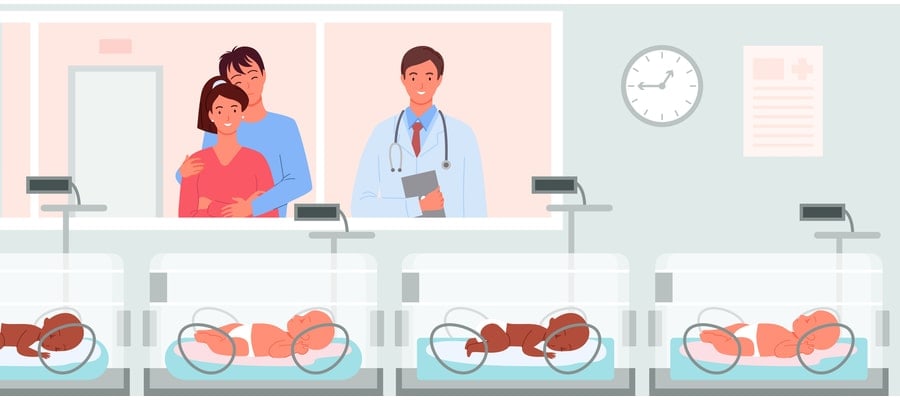
Being a parent is always a tough job, be it a mother or a father. A lot of things change when you welcome your newborn baby into your life. Sometimes when a premature baby is born due to any complications related to a baby’s health, a doctor will advise you to the neonatal intensive (noeontal intensive doctors) care unit (NICU). Now, as a parent, you must be worried and want to know what to expect when your baby is in the NICU. Let us discuss what CK Birla Hospital’s neonatology & paediatrics department has to offer you?
While a NICU is rarely part of a birth plan. But, knowing what neonatal services are available at the place where you are going to deliver can put you at ease. For example, it is much easier for the neonatal team to communicate with obstetricians and maternal-fetal medicine doctors a lot before the baby is born. This communication continues as the baby receives care from many specialists in the hospital, and then follows the infant after being released from the hospital, easing the transition of care from medical specialists to the baby’s new paediatrician.
Every parent’s experience in the NICU is different. One thing that mothers recall from their NICU days when they started the journey. They didn’t know what to expect once they got there. Some tests that the parents might notice their baby undergoing are the bilirubin test, oxygen level tests, sugar level tests, blood tests, and urine tests. Even though these tests can be daunting to parents, try and remind yourself that they are necessary for your baby’s advancement and proper growth. Infants get measured every day.
Following are some of the equipment you will see when you enter the NICU:
Infant warmers: These are small beds with heaters to keep babies warm while being monitored.
Incubators: They are small beds surrounded by clear, hard plastic. The temperature in the incubator is under control so that the baby’s body temperature stays where it should be. Doctors, nurses, and other caregivers treat babies through the holes in the sides of the incubator.
Phototherapy: Some newborn babies are born with jaundice, which causes the skin and whites of their eyes to turn yellow. Phototherapy helps in treating jaundice. During the treatment process, infants lie on a special light therapy blanket and have lights attached to their incubator. Most babies only need light therapy for a few days.
Monitors: With the help of monitors, doctors and nurses can easily keep track of your baby’s vital signs – temperature, heart rate, and breathing – from anywhere in the NICU.
The monitors include:
Feeding tubes: Breastmilk can often help babies that are born early. Sometimes mothers whose babies are in the NICU are not yet strong enough to nurse, but mothers can still pump milk and have their babies consume it. The hospital usually has staff who can help new mothers pump milk or even try nursing if their NICU babies seem healthy enough. Some NICU units also have a milk donation centre where other mothers donate their breastmilk to tiny infants in need of power.
Intravenous Catheter (IV): An intravenous catheter is a thin, flexible tube inserted into a vein to deliver fluids and medicines. Almost all babies in the intensive care unit have an IV. Infusions give some medications in small amounts 24 hours a day instead of injecting your baby every few hours. Intravenous treatment can refer to as a “drip” or “infusion”.
Lines: Some babies need more fluids and medicine than an intravenous catheter can give. Sizeable tubes called midlines placed in a large vein in the chest, neck, or groin. Doctors place arterial lines in the arteries instead of veins. They are used to monitor blood pressure and blood oxygen levels.
Ventilators: Babies in the intensive care unit sometimes need extra help with breathing. Babies who have been in intensive care for a long time (several months in a row) may have a tracheostomy (a plastic tube in the windpipe) connected to the ventilator at the other end.
Oxygen hood or nasal cannula: Some infants do not need a ventilator but need an extra oxygen supply. Babies who can breathe on their own can get oxygen from nasal cannulas ( a plastic tube inserted in their noses) or from an oxygen hood worn over the baby’s heads.
Also, read: What makes kids picky eaters and what may help them get over it
Following are some of the tests performed in NICU, including
In the worst cases, doctors go for specialized testing like computed tomography (CT) or magnetic resonance imaging (MRI) to examine the brain, radiographs to look for problems with the gastrointestinal tract, and echocardiograms to see the functioning of the heart.
Mothers can breastfeed their babies or offer formula in a bottle in the NICU.
Babies in the intensive care unit have a feeding schedule. Your baby’s nurse can tell you when to feed and sleep your baby. The more time you spend with your baby, the more you learn about:
NICU doctors and nurses play an important role in monitoring the baby’s growth and development. The Neonatal Care at the CK Birla Hospital provides expert neonatologists to ensure that the treatment is as comfortable for the baby as possible. Research has shown that babies nursed with the Development Care approach are healthier, develop faster and go home earlier. Consult top neonatologists at the Department of Neonatology & Paediatrics to learn more.